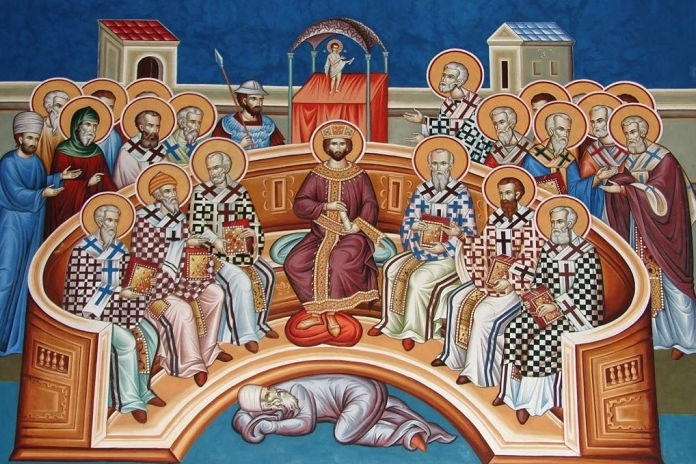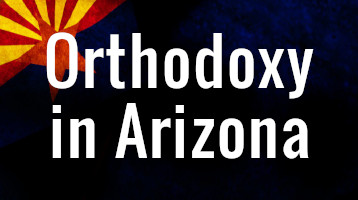
by Fr. Lawrence Farley
Those for whom ancient history is irrelevant and who equate “old” with “out-dated” (or better yet, “medieval” with “barbarically primitive”) will have trouble appreciating the Fathers of the First Council of Nicea, since they met and produced their work well over a thousand years ago, in 325 A.D. How could a creed so old be remotely relevant today? Accordingly, some churches have produced their own creeds (such as the United Church of Canada, which produced its own creed for alternative use in 1968. It is a cautionary tale, for it began
“Man is not alone; he lives in God’s world”
and they soon enough found that political correctness demanded its alteration to “We are not alone; we live in God’s world”). Among other things, the Fathers of Nicea declared the full divinity of Jesus of Nazareth by saying that He was homoousios with the Father—of the same essence as Him. Later attempts to create consensus would suggest that maybe it could be said that Jesus was homoiousios with the Father—“of like essence”. After all, it has been pointed out, it only involves the difference of one letter, and a tiny one at that. Why fight over a single iota, a single “i”? Who would care? Why should any sensible person get worked up over whether the pre-incarnate Word was homoousios with the Father or homoiousios? The ruckus of Nicea and afterward only went to prove how miserable and contentious those Christians were.
A moment’s thought however will reveal the nonsense of saying that Jesus was homoiousios with the Father. He was of “like essence”? What could that possibly mean? That He was divine-ish? God in an honourary kind of way? Sort of God? Almost God? Anyone not obviously drunk and who thinks for a second will realize that the distance between God and His creation is infinite, so that one is either absolutely God or not God at all. The eternal Creator, without beginning or limit, stands on one side of an ontological abyss, and all creation stands on the other side. One can’t be a little bit God any more than one can be a little bit pregnant. Like pregnancy, divinity is an all or nothing kind of thing—either one is completely divine or not divine at all. Either Jesus was God and homoousios with the Father or He was created and of a completely different essence than the Father. Even Arius, the villain of the Nicene piece, got that much right. But still one may ask: why should we care? Sure, we confess His divinity, but what does it really matter?
This is why it matters: salvation consists in giving one’s life, heart, and soul to God, living and dying for Him down to one’s last breath and one’s last drop of blood. The issue is: may we give such loyalty, allegiance, love, and commitment to Jesus of Nazareth, or not? If He is not truly God, then giving Him such allegiance would be idolatry. No one sensibly would live and die so totally for a mere celebrity. And if the Nicene Fathers were wrong and Jesus is simply just an ancient celebrity, we ought not to give Him our lives. Our admiration, perhaps, but not lives and our worship. But in fact the Fathers of Nicene were right, and Jesus of Nazareth is God in the flesh—Light of Light, true God of true God, begotten, not made, homoousios with the Father. It is through Him that all things were made, and to Him that all things shall return with bowed knee. It is our salvation that we bow the knee in love to Him even now before that final end, and confess that the road to His city runs through our heart.



